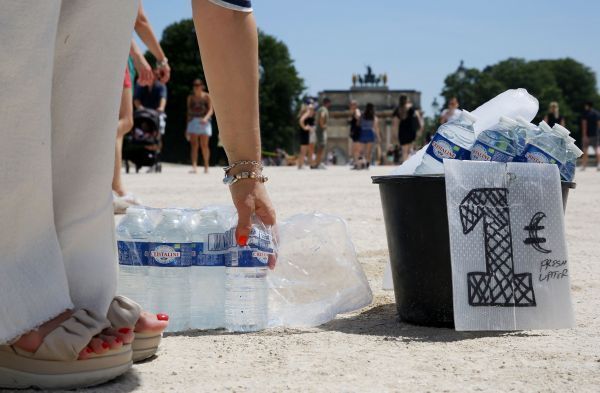[Original title] Western media: Beware! Drinking too much water is also dangerous
According to a July 10 article on the website of the Spanish newspaper El Pais, when drinking a lot of water “because it is good for your health” becomes a dangerous obsession, you may suffer from hydrophobia.

A passerby buys bottled water from a vendor on a street in Paris on July 17. (AFP)
Too much water can also be poisonous
The article says that everyone knows the “myth of 2 liters of water.” The habit of drinking a lot of water is endowed with miracles: clearer skin, younger body, more energy, better health. However, when water intake exceeds the capacity of the kidneys to excrete, the sodium level in the blood drops, resulting in water intoxication. Over time, mild symptoms such as headache, nausea, and in severe cases, convulsions and even death may occur.
How did we get here? In the 1970s, Evian and Perrier introduced the concept of high-end bottled water in advertising. Until then, bottled water was just an alternative to tap water, and since then drinking water brands have come to symbolize social status. Like handbags and shoes, drinking this or that brand of water signifies that you belong to a certain social group. The fitness boom played a decisive role: Carrying bottled water was a statement. In the decades since then, we’ve heard countless celebrities claim that water is a panacea. Legendary supermodel Ellie Macpherson said: “One of my most important beauty secrets, and I know it sounds like a cliché, is to drink 3 liters of water a day.” She created the myth of “a liter of water a day.”
Today, this phenomenon is fueled by massive advertising and because reusable drinking glasses are an accessory that lives up to the values of our time. Less plastic, more water. This is the perfect closed loop. The strong growth in bottled water consumption in recent years (in 2017, bottled water in the US surpassed soft drinks as the top-selling category), proves that the rhetoric of many celebrities has taken root in the hearts of the people – hydration is now regarded as a treatment for almost all problems in life. Good medicine to sell. Drinking water is no longer a means of quenching thirst, but almost a virtue. But for some, the habit of drinking water has become an obsession, even dangerous.
The amount of water you drink depends on many factors
First of all, scientists agree that our water needs vary from day to day, even within the same day, and that water demand depends on a variety of factors. Generally speaking, it is recommended to judge the degree of dehydration from the following 3 signs: thirst (usually when we are 1% dehydrated), weight change (rapid weight loss may be a sign) and urine color (if darker in color) , which means our bodies are curbing water loss, which means we need to drink more water; if the color is always too light, it means we’re consuming more than we need).
At the same time, thirst may seem unrelated to anxiety, but many people who suffer from anxiety often experience this feeling: During or after an anxiety attack, people often feel thirsty, need a glass or two of water, and Some people with anxiety disorders feel the need to drink more water each day. The latest trend coming from the United States is a large 4-liter water bottle, the most popular of which is the HydroMATE Motivational, which costs over 20 euros. What’s more, they use the app to remind themselves to “rehydrate”, just like a plant, so as not to wilt.
This is because anxiety can increase sweating, dry mouth, excessive urination, and what people call perceived dehydration or hypochondria: the thought of being thirsty in a state of anxiety only makes it more thirsty.
8 glasses of water a day is bullshit
In an article in The New York Times, Joshua Zeichner, a dermatologist at Mount Sinai Hospital in New York City, USA, debunks the classic beauty myth of models: “This idea is popular with patients and In the media, it is said that hydration equals healthy skin. But that’s not exactly how it works. The idea that you need to drink 8 glasses of water to keep your skin hydrated is pure bullshit.”
Almudena Nuño Gonzalez, a member of the Spanish Society of Dermatology and Venereology, offers one possible explanation: “A daily supplement of at least 2 liters of water plays an important role in overall health and Probably the same; but there is no research to prove that drinking more water makes the skin more supple.”
She concluded that effective skin hydration depends on two things: avoiding irritants and/or dehydrating agents that damage the sebum membrane, and moisturizing with a cream.
Alkaline water has no scientific basis
On the other hand, there is no scientific basis for the claim that alkaline water on the market is better than tap water. Some experts point to the marketing of alkaline water for its reputation. The pH value shows whether a liquid is acidic or basic. Pure water is neutral and has a pH of 7, while tap water has some natural fluctuations due to the mineral content it contains. Most bottled water is mildly acidic, and the alkaline waters that are sold generally claim to have a pH between 8 and 10. When we drink weakly alkaline water, the water is quickly neutralized by stomach acid before it is absorbed into the bloodstream, so the claims of “refreshing”, “detoxification” and “better hydration effect” have not been proven. Higher pH doesn’t mean better. There are indications that there is even a potential risk of water over-alkalinization.